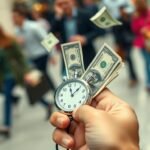Developing countries struggle with big budgets due to the high cost of development. They face slow growth in public finance and technical issues in managing spending. The International Monetary Fund (IMF) knows how crucial this issue is and can now help its members.
In less developed countries, revenue systems are weak and not well-suited for growth. A big issue is the heavy reliance on customs duties, which are often limited by trade issues. This makes it hard to increase revenue. Also, taxes based on old land values and specific indirect taxes don’t help with growth.
Key Takeaways
- Developing countries face challenges in balancing budgets due to slow revenue growth and difficulties controlling expenditures.
- Revenue systems in developing countries are often weak and unable to provide the resources needed for economic growth.
- Reliance on customs duties, fixed indirect taxes, and outdated land taxes hinder revenue growth.
- The IMF is aware of these public finance challenges and can offer assistance to member countries.
- Improving public finance systems is crucial for developing economies to achieve sustainable growth and development.
Revenue Constraints in Developing Economies
Developing economies face big challenges in managing their finances and making money. They often have weak revenue systems. This leads to complex and discouraging tax systems, which hurts production and investment.
Many of these countries heavily depend on import duties for revenue. But, this method is limited by balance of payments issues, fixed duties, and changes in what’s imported. This means less money from customs duties over time.
Inadequate Pricing of Public Services
Public services like electricity, transportation, and water charge low prices. These prices don’t cover costs or investments. So, these services need money from the government’s taxes, making things harder for public finances.
But, some countries set prices for public agencies so they can make enough money. They cover their investment programs and current costs. This makes these services more independent and less of a burden on taxes.
Fixing these revenue issues is key for developing economies to grow and develop sustainably. They need to improve their revenue systems, find more ways to make money, and set better prices for public services. This will make their finances stronger and more efficient.
Public Finance Expenditure and Budgeting Challenges

Developing economies struggle with public finance and budgeting. A big issue is the lack of expenditure prioritization. This means not using resources based on what’s most important. In less developed countries, this is often the case.
Another big challenge is the fragmented budgeting processes. Often, budgets are just a list of what different groups want. This doesn’t lead to smart use of money.
Compartmentalized Expenditures
Investment budgets and regular budgets are often kept separate. This can make it hard to see public spending as a whole. It also makes it tough to make smart choices about what to spend on first.
Earmarking and Rigid Allocations
Public spending control is also hurt by earmarking specific revenues for certain spending. And by setting aside fixed amounts for some programs. This can keep happening even if the reason for spending is no longer valid. It means money isn’t used well.
| Key Challenges in Public Finance Expenditure and Budgeting | Description |
|---|---|
| Lack of Expenditure Prioritization | Budgeting often lacks a clear process for distributing resources according to established priorities. |
| Fragmented Budgeting Processes | Budgets are frequently a compilation of funding requests rather than a cohesive plan for resource allocation. |
| Compartmentalized Expenditures | Investment and recurrent budgets are often separated, preventing a holistic view of public expenditure. |
| Earmarking and Rigid Allocations | Specific revenues are earmarked for particular expenditures, and fixed percentages are allocated to certain programs, reducing flexibility and control. |
Fixing these issues in public finance and budgeting is key for developing economies. It helps them use resources better, which supports growth and development.
Public Finance Role in Economic Stability

In developing economies, public finance is key to keeping things stable. Fiscal policy helps manage taxes and spending. It’s a strong tool for keeping finances balanced, controlling public debt, and working with monetary policy. This helps with economic growth and getting the money needed for development financing.
Developing countries often rely too much on unstable commodity exports. This can cause big changes in government income. When commodity prices go down, these countries see a big drop in taxes and revenue. Natural disasters like floods or earthquakes can make things even harder, making it tough to keep the economy stable.
To fix these issues, policymakers in these countries might use emergency fiscal measures. These can help fight inflation and fix balance of payments problems. But these quick fixes might not work well over time. That’s why it’s important to work on public finance and fiscal policy for the long term.
“Ideal solutions to the fiscal problems are not always available. Countries faced with the problem of curbing serious inflation and bringing balance of payments under control are often forced to adopt emergency fiscal measures which may be helpful in the short run but would be undesirable if long continued.”
To solve these problems, we need a complete plan. This includes making the revenue system stronger, focusing on what to spend money on, and having good budgeting processes. With help from groups like the IMF, developing countries can improve their fiscal policy and public finance. This can lead to more economic stability and sustainable growth.
IMF’s Assistance in Fiscal Policy Reform

The International Monetary Fund (IMF) helps developing countries improve their public finance systems. It has three main divisions that offer technical help and advice. These divisions focus on fiscal policy, tax systems, and budget management.
Tax Policy Division
The Tax Policy Division looks at how different taxes work with the economy. It advises on tax structures and helps countries create better tax laws. This aims to improve their tax systems.
Tax Administration Division
The Tax Administration Division tackles the issues of collecting taxes efficiently in developing countries. It gives advice on collecting taxes, estimating tax yields, and fighting tax evasion. This helps countries manage their taxes better.
Budget Division
The Budget Division is an expert in public budgeting. It helps with setting up budget structures, classifying budgets, and forecasting expenses and revenues. It also focuses on controlling government spending and financial reporting. The division aims to improve how countries plan their budgets for the short and long term.
The IMF’s Fiscal Affairs Department provides detailed technical help to developing countries. It strengthens their fiscal policies, tax systems, and budget management skills.
| IMF Fiscal Affairs Department Divisions | Focus Areas |
|---|---|
| Tax Policy Division |
|
| Tax Administration Division |
|
| Budget Division |
|
Also Read : Are Refinance Loan The Solution To Your Financial Goals?
Conclusion
Many developing economies struggle with their fiscal systems, which can slow down economic growth and stability. They often have weak revenue systems and rely too much on import duties. Also, public services are not priced well, which limits government funds.
The International Monetary Fund’s Fiscal Affairs Department offers help to these countries. They provide technical support in tax policy, tax administration, and budget management reforms. The goal is to make fiscal frameworks stronger and increase economic resilience.
Developing countries need to keep improving their public finance systems. They should focus on collecting more revenue and managing their spending better. With the right policies and technical help, they can use public finance to boost sustainable economic growth and development.
FAQs
Q: What is the main issue with public finance in 2024?
A: The main issue in public finance for 2024 revolves around effective management of government debt, optimizing revenues and expenditures, and ensuring equitable income redistribution among local governments and school districts.
Q: How does borrowing impact public finance practices?
A: Borrowing is a crucial part of public finance practices as it allows state governments and local governments to fund projects and services by issuing bonds, which can be either general obligation bonds or revenue bonds, depending on the source of repayment.
Q: What are revenue bonds and how do they differ from general obligation bonds?
A: Revenue bonds are securities issued to finance specific projects and are repaid from the revenue generated by those projects, such as utilities or airports. In contrast, general obligation bonds are backed by the full faith and credit of the issuer, typically funded through taxes or other government revenues.
Q: Can you explain the concept of income redistribution in public finance?
A: Income redistribution in public finance refers to the allocation of government revenues collected through taxes, such as income tax and sales tax, to provide services and benefits aimed at reducing economic inequalities among different income groups.
Q: What is an interest rate swap and how is it used in public finance?
A: An interest rate swap is a financial derivative that allows issuers to exchange fixed interest rate payments for floating interest rate payments, or vice versa. This is often used by public finance groups to manage interest rate risk associated with borrowing.
Q: How do general obligation bonds impact a local government’s balance sheet?
A: General obligation bonds typically appear as liabilities on a local government’s balance sheet, reflecting the total government debt. They can impact financial statements by influencing cash flow and the overall financial health of the municipality.
Q: What does the process of refunding bonds involve?
A: Refunding bonds involves issuing new bonds to replace older bonds, usually to take advantage of lower interest rates or to restructure debt. This can help improve cash flow and reduce overall interest expenses for the issuer.
Q: How do interest rates affect the issuance of bonds in public finance?
A: Interest rates have a significant impact on the issuance of bonds, as higher interest rates may deter borrowing due to increased costs, while lower rates can encourage issuers to finance projects through the sale of tax-exempt bonds, benefiting from reduced financing costs.
Q: What role does the public finance group play in managing government revenue?
A: The public finance group is responsible for advising on the structure of public borrowing, ensuring effective management of government revenue, optimizing the issuance of securities, and guiding local and state governments in fiscal policies that promote economic stability and growth.
Source Links
- https://www.oecd-ilibrary.org/environment/scaling-up-adaptation-finance-in-developing-countries_b0878862-en
- https://www.elibrary.imf.org/view/journals/022/0002/004/article-A007-en.xml
- https://www.oecd.org/en/topics/sub-issues/public-finance.html





